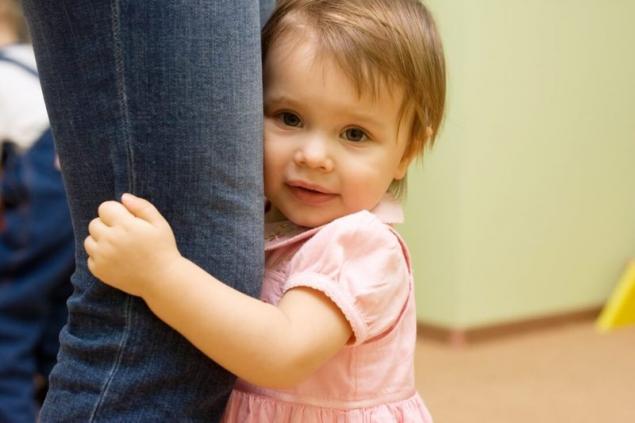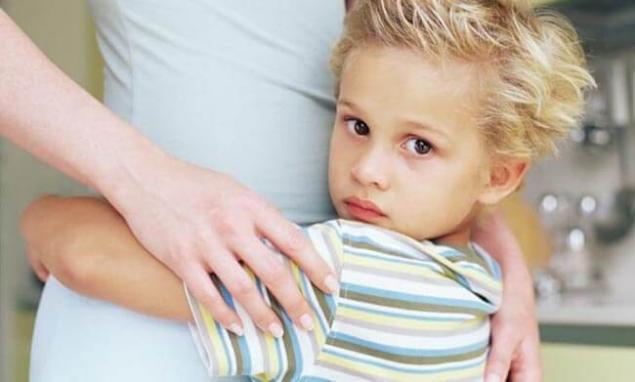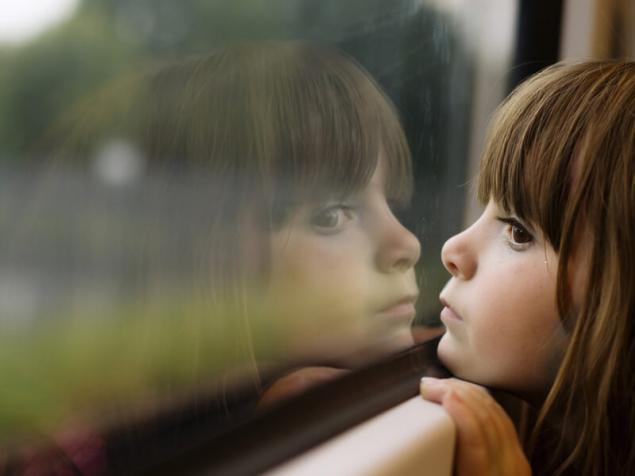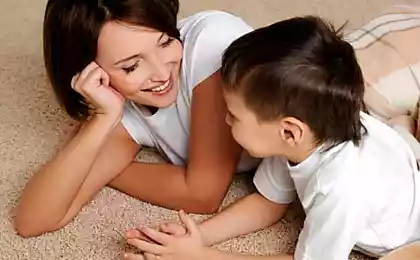779
Really need kindergarten?
I went to kindergarten from the age of three and vividly remember how others around me in unison spared, in one voice saying that it was too early and why torture the child. However, not even three, but five preschools then visited a few. In our class of poor fellows were one. Everyone else sat to school at home with grandparents.
Over time, the situation changed. And the grandmother was in no hurry to retire, and kindergartens became more and more until recently, however, the need to give a child in kindergarten was perceived as a necessary measure. That is, not from a good life. If the mother had the opportunity to work, the question of the garden was not even raised. It goes without saying that the school will deal with children on your own? Neither family nor friends just wouldn't understand her if she's not going to "put" the child in the garden.

Now in this respect there have been notable successes. Increasingly in my professional horizon families that have every opportunity not to drive a child to kindergarten. Or wife is absolutely not eager to work even "for the soul", and my husband is quite able to provide for his family. Or grandma is ready to devote himself to his grandson, or the parents have money for a babysitter. But...
A child with three or four years you'll spend in kindergarten. And well he there enjoyed fellowship and collective games! So no! Baby garden does not like, in the morning whining, complaining that it hurt, begging at least a little while. And the other goes unchallenged, but is often sick. And the third was nervous, irritable, aggressive. I'm not talking about hyperactive children, who are now more and more. For them, kindergarten is absolutely unbearable psychological burden.
But when you start talking about it, often run into the impenetrable wall. I first pondered the nature of this resistance a few years ago when I was in consultation came a young couple with a boy of four and a half years.
Steve hugged the mother, hiding her face in her knees, flatly refused to go without parents in the next room to see toys.
— He always behaves? — I asked.
— With strangers — Yes. When mastered, will, of course, more relaxed, but in fact we have him trapped. Walking anywhere is not love, even a walk will not pull out. Children scared trembling at the knees. Adults less, too afraid.
I was absolutely sure that Oh, that child's parents and it never occurred to define in a kindergarten. But I was wrong! In the garden, he had gone three years. Six months, however, continually ached when I got "into the light", then all day sitting on a chair, not responding to calls to play with children. Now the chair is not sitting, but the children still decide.
— They are too noisy, screaming, fighting, and he does not understand, — said the mother. But at least the tantrums, as before, goes into at parting — and that is good. Led tap with complaints of fatigue, attention span, the crying, the tantrums and bedwetting (enuresis). And in two and a half years before kindergarten, no enuresis the child was not observed. With him then no problems: quiet, calm, docile boy. Others were afraid, but not like now. He even children tried to play, but now to hear of anyone not willing.
The picture is very reminiscent of the psychological trauma caused to the child of early separation from family. What, in truth, it was quite possible to guess yourself without the advice of a specialist. But mom and dad didn't want to see the obvious.

— Pick up from the garden?! — horrified mother. But... Where is it then learn to communicate? No, thank you! This can not be and speeches! At home he's a very wildly.
Although it is in the kindergarten and not at home, he had lost even those small skills that he was able to buy up to three years.
— Preparation for school? — picked up dad. — No, we are not able to teach the child all things which are now taught in kindergarten.
Although attention Stepa dissipated just in the garden, for nervous overstrain. And to school was still two and a half years — for a toddler a great time. And what made this special teach kindergarten educators? Why people with higher education (technical and humanitarian) is not able to learn this wisdom? And more recently as a grandmother without any higher education is successfully taught his grandchildren-preschoolers to read and count? Some taught and still...
To these and other questions parents have not found, but it was clear that they are not even going to look for them. The main issue was resolved a long time ago, finally and irrevocably. Steve in the garden walk will in all circumstances, because WITHOUT a GARDEN is SIMPLY IMPOSSIBLE.
The event was so bright, and parental resistance so blatantly irrational that thought is about the unconscious mechanisms of this resistance arises by itself. At the level of consciousness argue there was nothing. But the subconscious whispered by Stepin the opposite parents, and his whisper was more powerful. Why?
"Bezumnye mom"
30 years ago, America put experience: monkeys robbed of cubs, reared them and began to watch how they will raise their kids.
It turned out that "bezumnye mom" (as the scientists called apes raised in human care) is not able to care for their young and do not feel them kindred feelings, because in his childhood had before eyes a sample of maternal care. Their memories captured very different images of early (imprinting). For the same reasons, and many orphans grow up, experience serious difficulties in building a family. Today's young parents, certainly not the children of the orphanage, and certainly not monkeys, but this is probably the first generation that is massively attended kindergartens.
— We "went into the garden and nothing grew!"— they argue, forgetting, as often happens, about his childhood disappointments and grievances.
And it is difficult to imagine how you can do without the daycare because the collective upbringing for them — imprinting. And early impressions are very firmly rooted in the subconscious. We do not seem to remember, don't realize, but they have not gone away and, as gray cardinals, invisibly govern our thoughts and feelings.
Most importantly, the home of peace and rest
Meanwhile, experienced doctors and teachers say that the pre-school child most needed maternal affection and warm (first of all, psychologically) comfortable house, quiet, friendly atmosphere in the family. In such circumstances, it blooms and grows normally.
In fact, smart people warned about this more than a hundred years ago, when kindergartens were just starting to appear. "No matter how rational in their classes, and children's games, — wrote the famous Russian teacher K. D. Ushinsky, they can have a harmful effect on the child if he holds them most of the day. No matter how clever the occupation or the kind of game that you learn in kindergarten, but they are bad because that child is not itself learned, and the obsessive kindergarten in this respect, so they are harmful".
Ushinsky believed that "noisy society, even children, if the child is in it from morning to evening seems to act bad".
"For a child, — he continued — need a completely secluded and independent attempts of children's activities, not caused by the imitation of children or adults".

Did not yet employ the term "psychological stress" or "stress", but the danger got right. Now the same insights are already being made on a scientific basis.
A couple of years ago I happened to hear at a conference presentation of our largest pediatrician, academician V. A. Tabolina. He talked about the dangers of many experiments that were set in the twentieth century, the young children, including... about the nursery. Yes, something we are so used to that already can not imagine myself without it, life really is an experiment with a relatively short history. Its essence was to remove children from families and send them to the education of the state. Because the family, according to the ideologues of building a new society, was soon to die.
But experience has shown that no one and nothing can replace a child's mother. Although the consequences of early separation of the child from the family may come back to haunt later. For example, in adolescence.
Here is a very typical story:
"To the school Mary was very attached to me. Even too. Now my heart swells when I remember how she asked: "Mommy, I today will not go to kindergarten. Let's have a little stay at home, I won't stop you". But I was not before. No, of course I'm very loved daughter, tried her beautiful dress, bought toys and sweets. But the work fascinated me much more. And in my personal life were different experiences. Now Masha sixteen. We live in one room, but between us like an invisible wall. And it is not in me. I want to establish a contact with her, but she me in not let me. She was accustomed to do without me, and although I feel that her daughter is lonely and suffering because of this, we are unable to restore the lost relationship. Probably because the connection was lost so early, not having as it should be formed".
But what about communication with children?
People, a little familiar with child psychology, greatly exaggerate the need for preschoolers in the children's team. Children three to four years usually play, so to speak, side by side but not together. And in 5-6 years they have not friends in the sense which invest in this concept we adults. Friendship kids is unstable and situational. Today one friend on the Playground, tomorrow — another. Often even the name of "friend" don't bother to ask.
— What is the name of the boy who came by today to visit us? — I have repeatedly asked his eldest son (who, incidentally, was then not five, but seven or eight years!).
— I do not remember... the Other, shrugged Philip.
And so, I brought home another boy, and the previous was not even mentioned.
The need for true friendship appears closer to adolescence, and pre-schooler enough to play periodically with one of the peers, not even necessarily daily. He has not yet left the family. For it is in the family circle the most important relationships and most importantly, communication.
But now often do the opposite. Preschooler throwing up out of the family for the whole day immersed in children's collective. Although a grown man hard from morning till evening to be in a strange society. What can we say about a kid who gets too exhausted faster, easier overexcited?! The harder it is to communicate with children and adults, the more care should be dosing this communication. Otherwise, the child's behavior will worsen, and the difficulty will grow like a snowball.
And the school would be like?
This question is asked always. But in school, compared to kindergarten, a much more gentle conditions.
Are you surprised? — Judge for yourself.
To communicate normally, without conflicts, quarrels and fights, many preschoolers and younger children do not yet know how. But in kindergarten the kids spend almost the whole day, and in elementary school — only a few hours. While in school they are constantly busy and are in the "free flight" just for change.
In kindergarten, on the contrary, targeted training don't last long. Most of the time is allotted for games and walks. And the teacher is not physically able to keep up with all, because children in the group of 20-25 people. Someone will certainly start to hurt, tease. Others are also not averse to "support the company". So the sensitive and touchy child in the garden really hard. And require him to he altered, is just silly.
Much smarter would be not to put the child in such a difficult psychological situation. To obtain communication skills that will serve him in school, he can, playing from time to time with the children, your buddies or visiting a couple times a week any Studio, since they are now for kids all over this city. published
Based on the book by T. Shishova, “So the child was not difficult”
Also interesting: the best kindergarten in the world (Video)
Kindergarten: the illusion of choice
Source: azbyka.ru/deti/dejstvitel-no-li-neobhodim-detskij-sad
Over time, the situation changed. And the grandmother was in no hurry to retire, and kindergartens became more and more until recently, however, the need to give a child in kindergarten was perceived as a necessary measure. That is, not from a good life. If the mother had the opportunity to work, the question of the garden was not even raised. It goes without saying that the school will deal with children on your own? Neither family nor friends just wouldn't understand her if she's not going to "put" the child in the garden.

Now in this respect there have been notable successes. Increasingly in my professional horizon families that have every opportunity not to drive a child to kindergarten. Or wife is absolutely not eager to work even "for the soul", and my husband is quite able to provide for his family. Or grandma is ready to devote himself to his grandson, or the parents have money for a babysitter. But...
A child with three or four years you'll spend in kindergarten. And well he there enjoyed fellowship and collective games! So no! Baby garden does not like, in the morning whining, complaining that it hurt, begging at least a little while. And the other goes unchallenged, but is often sick. And the third was nervous, irritable, aggressive. I'm not talking about hyperactive children, who are now more and more. For them, kindergarten is absolutely unbearable psychological burden.
But when you start talking about it, often run into the impenetrable wall. I first pondered the nature of this resistance a few years ago when I was in consultation came a young couple with a boy of four and a half years.
Steve hugged the mother, hiding her face in her knees, flatly refused to go without parents in the next room to see toys.
— He always behaves? — I asked.
— With strangers — Yes. When mastered, will, of course, more relaxed, but in fact we have him trapped. Walking anywhere is not love, even a walk will not pull out. Children scared trembling at the knees. Adults less, too afraid.
I was absolutely sure that Oh, that child's parents and it never occurred to define in a kindergarten. But I was wrong! In the garden, he had gone three years. Six months, however, continually ached when I got "into the light", then all day sitting on a chair, not responding to calls to play with children. Now the chair is not sitting, but the children still decide.
— They are too noisy, screaming, fighting, and he does not understand, — said the mother. But at least the tantrums, as before, goes into at parting — and that is good. Led tap with complaints of fatigue, attention span, the crying, the tantrums and bedwetting (enuresis). And in two and a half years before kindergarten, no enuresis the child was not observed. With him then no problems: quiet, calm, docile boy. Others were afraid, but not like now. He even children tried to play, but now to hear of anyone not willing.
The picture is very reminiscent of the psychological trauma caused to the child of early separation from family. What, in truth, it was quite possible to guess yourself without the advice of a specialist. But mom and dad didn't want to see the obvious.

— Pick up from the garden?! — horrified mother. But... Where is it then learn to communicate? No, thank you! This can not be and speeches! At home he's a very wildly.
Although it is in the kindergarten and not at home, he had lost even those small skills that he was able to buy up to three years.
— Preparation for school? — picked up dad. — No, we are not able to teach the child all things which are now taught in kindergarten.
Although attention Stepa dissipated just in the garden, for nervous overstrain. And to school was still two and a half years — for a toddler a great time. And what made this special teach kindergarten educators? Why people with higher education (technical and humanitarian) is not able to learn this wisdom? And more recently as a grandmother without any higher education is successfully taught his grandchildren-preschoolers to read and count? Some taught and still...
To these and other questions parents have not found, but it was clear that they are not even going to look for them. The main issue was resolved a long time ago, finally and irrevocably. Steve in the garden walk will in all circumstances, because WITHOUT a GARDEN is SIMPLY IMPOSSIBLE.
The event was so bright, and parental resistance so blatantly irrational that thought is about the unconscious mechanisms of this resistance arises by itself. At the level of consciousness argue there was nothing. But the subconscious whispered by Stepin the opposite parents, and his whisper was more powerful. Why?
"Bezumnye mom"
30 years ago, America put experience: monkeys robbed of cubs, reared them and began to watch how they will raise their kids.
It turned out that "bezumnye mom" (as the scientists called apes raised in human care) is not able to care for their young and do not feel them kindred feelings, because in his childhood had before eyes a sample of maternal care. Their memories captured very different images of early (imprinting). For the same reasons, and many orphans grow up, experience serious difficulties in building a family. Today's young parents, certainly not the children of the orphanage, and certainly not monkeys, but this is probably the first generation that is massively attended kindergartens.
— We "went into the garden and nothing grew!"— they argue, forgetting, as often happens, about his childhood disappointments and grievances.
And it is difficult to imagine how you can do without the daycare because the collective upbringing for them — imprinting. And early impressions are very firmly rooted in the subconscious. We do not seem to remember, don't realize, but they have not gone away and, as gray cardinals, invisibly govern our thoughts and feelings.
Most importantly, the home of peace and rest
Meanwhile, experienced doctors and teachers say that the pre-school child most needed maternal affection and warm (first of all, psychologically) comfortable house, quiet, friendly atmosphere in the family. In such circumstances, it blooms and grows normally.
In fact, smart people warned about this more than a hundred years ago, when kindergartens were just starting to appear. "No matter how rational in their classes, and children's games, — wrote the famous Russian teacher K. D. Ushinsky, they can have a harmful effect on the child if he holds them most of the day. No matter how clever the occupation or the kind of game that you learn in kindergarten, but they are bad because that child is not itself learned, and the obsessive kindergarten in this respect, so they are harmful".
Ushinsky believed that "noisy society, even children, if the child is in it from morning to evening seems to act bad".
"For a child, — he continued — need a completely secluded and independent attempts of children's activities, not caused by the imitation of children or adults".

Did not yet employ the term "psychological stress" or "stress", but the danger got right. Now the same insights are already being made on a scientific basis.
A couple of years ago I happened to hear at a conference presentation of our largest pediatrician, academician V. A. Tabolina. He talked about the dangers of many experiments that were set in the twentieth century, the young children, including... about the nursery. Yes, something we are so used to that already can not imagine myself without it, life really is an experiment with a relatively short history. Its essence was to remove children from families and send them to the education of the state. Because the family, according to the ideologues of building a new society, was soon to die.
But experience has shown that no one and nothing can replace a child's mother. Although the consequences of early separation of the child from the family may come back to haunt later. For example, in adolescence.
Here is a very typical story:
"To the school Mary was very attached to me. Even too. Now my heart swells when I remember how she asked: "Mommy, I today will not go to kindergarten. Let's have a little stay at home, I won't stop you". But I was not before. No, of course I'm very loved daughter, tried her beautiful dress, bought toys and sweets. But the work fascinated me much more. And in my personal life were different experiences. Now Masha sixteen. We live in one room, but between us like an invisible wall. And it is not in me. I want to establish a contact with her, but she me in not let me. She was accustomed to do without me, and although I feel that her daughter is lonely and suffering because of this, we are unable to restore the lost relationship. Probably because the connection was lost so early, not having as it should be formed".
But what about communication with children?
People, a little familiar with child psychology, greatly exaggerate the need for preschoolers in the children's team. Children three to four years usually play, so to speak, side by side but not together. And in 5-6 years they have not friends in the sense which invest in this concept we adults. Friendship kids is unstable and situational. Today one friend on the Playground, tomorrow — another. Often even the name of "friend" don't bother to ask.
— What is the name of the boy who came by today to visit us? — I have repeatedly asked his eldest son (who, incidentally, was then not five, but seven or eight years!).
— I do not remember... the Other, shrugged Philip.
And so, I brought home another boy, and the previous was not even mentioned.
The need for true friendship appears closer to adolescence, and pre-schooler enough to play periodically with one of the peers, not even necessarily daily. He has not yet left the family. For it is in the family circle the most important relationships and most importantly, communication.
But now often do the opposite. Preschooler throwing up out of the family for the whole day immersed in children's collective. Although a grown man hard from morning till evening to be in a strange society. What can we say about a kid who gets too exhausted faster, easier overexcited?! The harder it is to communicate with children and adults, the more care should be dosing this communication. Otherwise, the child's behavior will worsen, and the difficulty will grow like a snowball.
And the school would be like?
This question is asked always. But in school, compared to kindergarten, a much more gentle conditions.
Are you surprised? — Judge for yourself.
To communicate normally, without conflicts, quarrels and fights, many preschoolers and younger children do not yet know how. But in kindergarten the kids spend almost the whole day, and in elementary school — only a few hours. While in school they are constantly busy and are in the "free flight" just for change.
In kindergarten, on the contrary, targeted training don't last long. Most of the time is allotted for games and walks. And the teacher is not physically able to keep up with all, because children in the group of 20-25 people. Someone will certainly start to hurt, tease. Others are also not averse to "support the company". So the sensitive and touchy child in the garden really hard. And require him to he altered, is just silly.
Much smarter would be not to put the child in such a difficult psychological situation. To obtain communication skills that will serve him in school, he can, playing from time to time with the children, your buddies or visiting a couple times a week any Studio, since they are now for kids all over this city. published
Based on the book by T. Shishova, “So the child was not difficult”
Also interesting: the best kindergarten in the world (Video)
Kindergarten: the illusion of choice
Source: azbyka.ru/deti/dejstvitel-no-li-neobhodim-detskij-sad
Ford Carr-E: fancy an electric skateboard to overcome the "last mile"
A causal relationship of diseases occurrence























